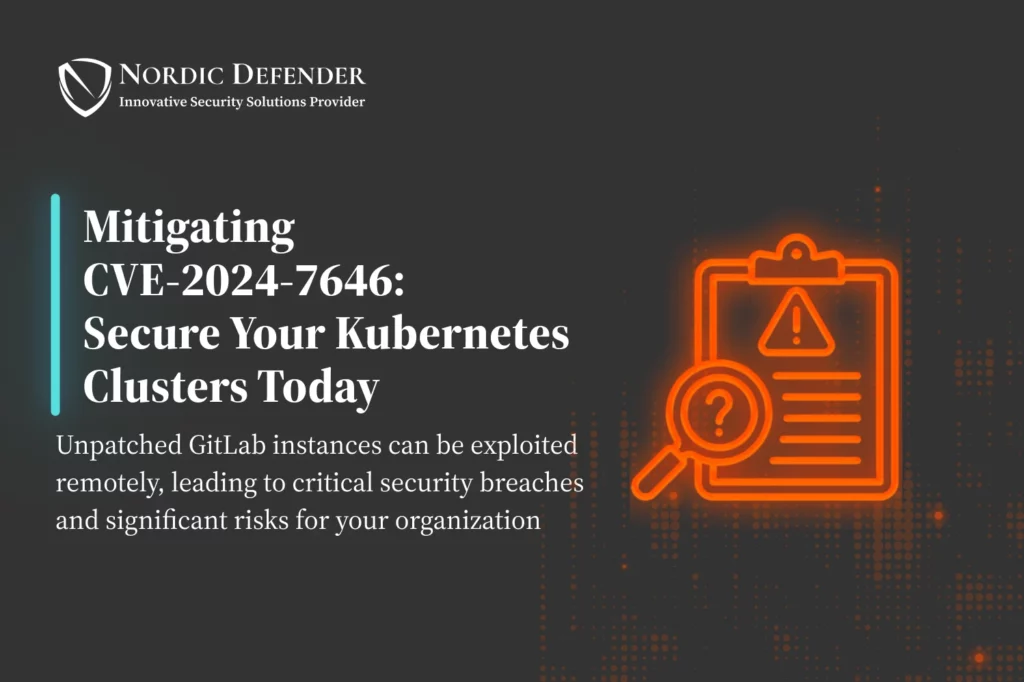The recent discovery of CVE-2024-7646, a critical vulnerability in the ingress-nginx Kubernetes controller, has sent ripples through the cybersecurity community. This flaw, which allows attackers to bypass annotation validation, poses a significant threat to the security and integrity of Kubernetes clusters. In this article, we will explore the technical details of the vulnerability, its potential impact, and comprehensive strategies for prevention and detection.
Technical Details of CVE-2024-7646
The ingress-nginx controller is a widely used component in Kubernetes environments, responsible for managing external access to services within the cluster. The CVE-2024-7646 vulnerability arises from improper validation of annotations, which are key-value pairs used to configure various aspects of the ingress-nginx controller.
Exploitation Mechanism of CVE-2024-7646
Attackers can exploit this vulnerability by injecting malicious content into annotations. Due to the lack of proper validation, these malicious annotations can bypass security checks and execute arbitrary commands within the ingress-nginx controller. This can lead to several severe consequences, including:
- Command Injection: Attackers can execute arbitrary commands within the ingress-nginx controller, potentially gaining control over the entire cluster.
- Credential Exposure: The ingress-nginx controller often has access to sensitive credentials and secrets. Exploiting this vulnerability can allow attackers to access and exfiltrate these credentials.
- Service Disruption: Malicious annotations can disrupt the normal operation of the ingress-nginx controller, leading to service outages and degraded performance.
Broader Implications of CVE-2024-7646
The CVE-2024-7646 vulnerability highlights several broader implications for Kubernetes security:
- Annotation Security: Annotations are a powerful tool for configuring Kubernetes resources, but they also introduce potential security risks. This vulnerability underscores the need for robust validation mechanisms to ensure the integrity of annotations.
- Supply Chain Security: The ingress-nginx controller is a critical component in many Kubernetes deployments. Vulnerabilities in such widely used components can have far-reaching impacts, emphasizing the importance of securing the software supply chain.
- Zero Trust Architecture: The principle of zero trust, which assumes that threats can originate from both external and internal sources, is crucial for Kubernetes security. Implementing zero trust principles can help mitigate the risks associated with vulnerabilities like CVE-2024-7646.
Comprehensive Prevention and Mitigation Strategies against CVE-2024-7646
To safeguard your Kubernetes clusters from the CVE-2024-7646 vulnerability, consider implementing the following strategies:
Upgrade and Patch Management
- Upgrade Ingress-NGINX Controller: Ensure that your ingress-nginx controller is updated to version v1.11.2 or later. Regularly apply security patches to all components of your Kubernetes environment.
Network Security
- Implement Network Policies: Use Kubernetes network policies to restrict communication between pods. This can help contain the impact of an exploited vulnerability and prevent lateral movement within the cluster.
Access Control
- Enable Role-Based Access Control (RBAC): Implement RBAC to enforce the principle of least privilege. Ensure that only authorized users and services have access to sensitive resources and configurations.
Security Audits and Compliance
- Regular Security Audits: Conduct regular security audits of your Kubernetes clusters to identify and remediate potential vulnerabilities. Use automated tools like kube-bench and kube-hunter to streamline the audit process.
- Compliance Monitoring: Ensure that your Kubernetes environment complies with relevant security standards and regulations. Implement continuous compliance monitoring to detect and address deviations promptly.
Monitoring and Detection
- Log Monitoring: Enable comprehensive logging for your ingress-nginx controller and other critical components. Use centralized logging solutions like ELK Stack or Fluentd to aggregate and analyze logs for suspicious activities.
- Intrusion Detection Systems (IDS): Deploy IDS solutions to detect and alert on potential security incidents. Tools like Falco can provide real-time detection of anomalous behaviors in your Kubernetes clusters.
Incident Response
- Develop an Incident Response Plan: Create and regularly update an incident response plan tailored to your Kubernetes environment. Ensure that your team is trained to respond to security incidents promptly and effectively.
- Threat Intelligence: Stay informed about the latest threats and vulnerabilities affecting Kubernetes. Subscribe to threat intelligence feeds and participate in security communities to stay ahead of emerging risks.
Conclusion of CVE-2024-7646
The CVE-2024-7646 vulnerability in the ingress-nginx Kubernetes controller serves as a stark reminder of the evolving threat landscape. By understanding the technical details and broader implications of this vulnerability, organizations can implement comprehensive prevention and detection strategies to protect their Kubernetes environments. Prioritizing security and adopting a proactive approach will help ensure the resilience and integrity of your systems in the face of emerging threats.
Stay vigilant and committed to cybersecurity excellence.
